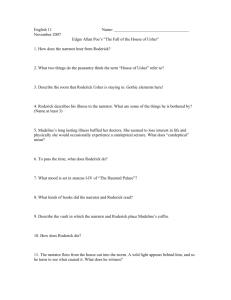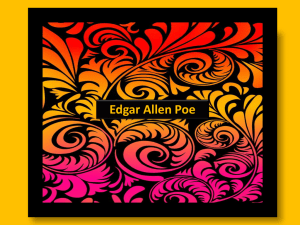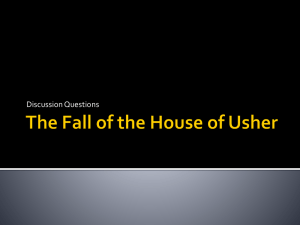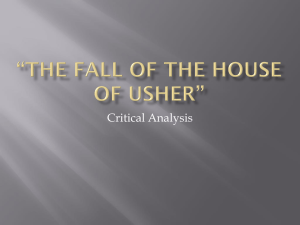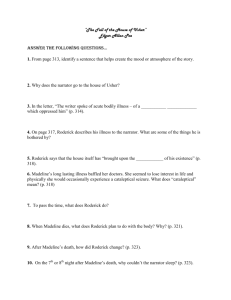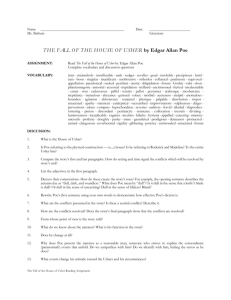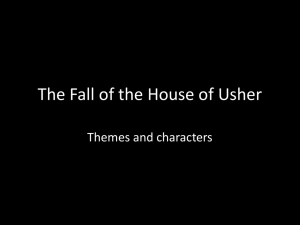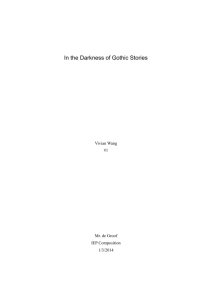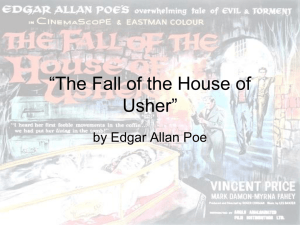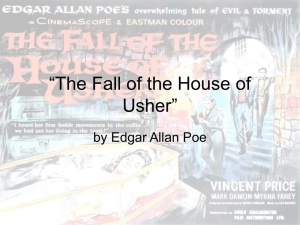The Fall of the House of Usher: Themes & Analysis
advertisement
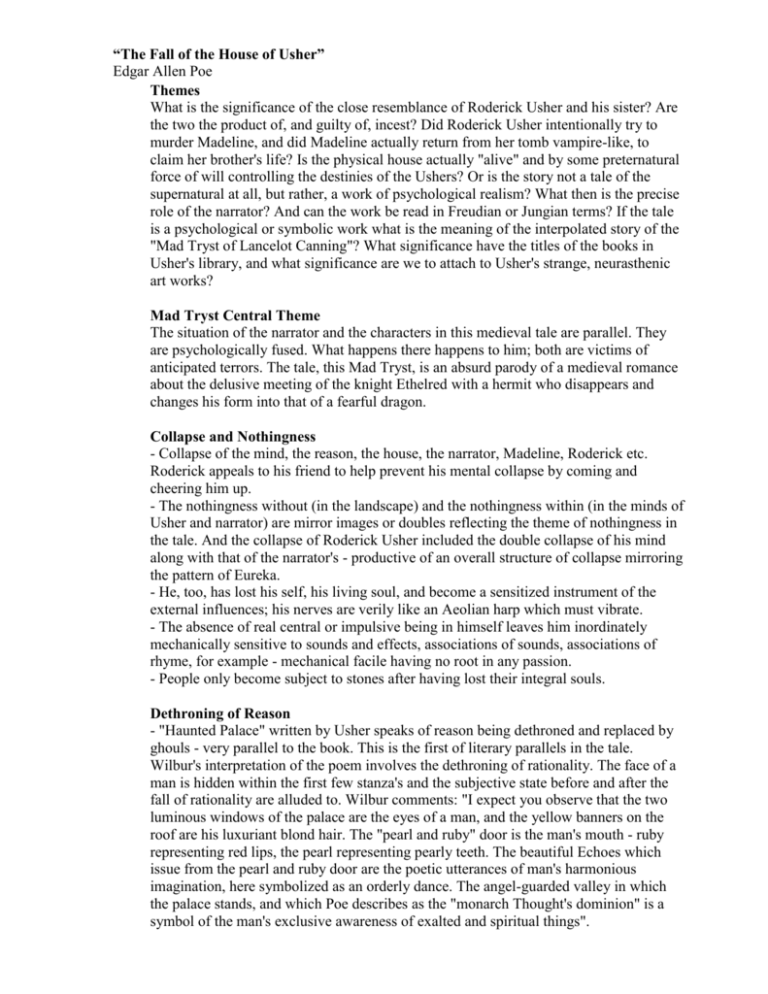
“The Fall of the House of Usher” Edgar Allen Poe Themes What is the significance of the close resemblance of Roderick Usher and his sister? Are the two the product of, and guilty of, incest? Did Roderick Usher intentionally try to murder Madeline, and did Madeline actually return from her tomb vampire-like, to claim her brother's life? Is the physical house actually "alive" and by some preternatural force of will controlling the destinies of the Ushers? Or is the story not a tale of the supernatural at all, but rather, a work of psychological realism? What then is the precise role of the narrator? And can the work be read in Freudian or Jungian terms? If the tale is a psychological or symbolic work what is the meaning of the interpolated story of the "Mad Tryst of Lancelot Canning"? What significance have the titles of the books in Usher's library, and what significance are we to attach to Usher's strange, neurasthenic art works? Mad Tryst Central Theme The situation of the narrator and the characters in this medieval tale are parallel. They are psychologically fused. What happens there happens to him; both are victims of anticipated terrors. The tale, this Mad Tryst, is an absurd parody of a medieval romance about the delusive meeting of the knight Ethelred with a hermit who disappears and changes his form into that of a fearful dragon. Collapse and Nothingness - Collapse of the mind, the reason, the house, the narrator, Madeline, Roderick etc. Roderick appeals to his friend to help prevent his mental collapse by coming and cheering him up. - The nothingness without (in the landscape) and the nothingness within (in the minds of Usher and narrator) are mirror images or doubles reflecting the theme of nothingness in the tale. And the collapse of Roderick Usher included the double collapse of his mind along with that of the narrator's - productive of an overall structure of collapse mirroring the pattern of Eureka. - He, too, has lost his self, his living soul, and become a sensitized instrument of the external influences; his nerves are verily like an Aeolian harp which must vibrate. - The absence of real central or impulsive being in himself leaves him inordinately mechanically sensitive to sounds and effects, associations of sounds, associations of rhyme, for example - mechanical facile having no root in any passion. - People only become subject to stones after having lost their integral souls. Dethroning of Reason - "Haunted Palace" written by Usher speaks of reason being dethroned and replaced by ghouls - very parallel to the book. This is the first of literary parallels in the tale. Wilbur's interpretation of the poem involves the dethroning of rationality. The face of a man is hidden within the first few stanza's and the subjective state before and after the fall of rationality are alluded to. Wilbur comments: "I expect you observe that the two luminous windows of the palace are the eyes of a man, and the yellow banners on the roof are his luxuriant blond hair. The "pearl and ruby" door is the man's mouth - ruby representing red lips, the pearl representing pearly teeth. The beautiful Echoes which issue from the pearl and ruby door are the poetic utterances of man's harmonious imagination, here symbolized as an orderly dance. The angel-guarded valley in which the palace stands, and which Poe describes as the "monarch Thought's dominion" is a symbol of the man's exclusive awareness of exalted and spiritual things". - The eye-like windows of the palace are no longer "luminous", but have become redlitten - they are like the bloodshot eyes of a madman or a drunkard. As for the mouth of the allegorized man, it is now "pale" rather than "pearl and ruby" and through it come no sweet Echoes, as before, but the wild laughter of a jangling and discordant mind. Psychological Doubles In meeting Usher, the narrator is symbolically staring into the face of his psychological double, and when he steps through the "gothic" archway of Usher's home into the dark, black-floored hall with its carved, niched, fretted architectural features, lit by "feeble gleams" of "encrimsoned" light that barely makes it way through elaborately "trellised panes" , it is clear that the narrator has stepped into the confused subjective world of Gothic terror and horror. Dreams & Hallucinations - The gaseous cloud surrounding the house could have been marsh gas, which has hallucinatory effects. - Not altogether insignificant that Madeline's burial chamber is located beneath what the narrator describes as, "my own sleeping compartment". The narrator mentions dream earlier concerning his perceptions of the house. Could the whole experience have been a dream? Apocalyptic Theme - The physical collapse of the decayed mansion into the lake beneath has universal archetypal appeal--the apocalypse, the ending of things, the collapse of all constructions at the moment of final atomic explosion. Summary of the story Roderick and his twin sister Madeline are the last of the all time-honored "House of Usher." They are both suffering from rather strange illnesses which may be attributed to the intermarriage of the family. "...[T]he stem of the Usher race...had put forth, at no period, any enduring branch; in other words, that the entire family lay in the direct line of descent, and had always, with very trifling and very temporary variation, so lain." Roderick suffers from "a morbid acuteness of the senses"; while Madeline's illness is characterized by "...a settled apathy, a gradual wasting away of the person, and frequent although transient affections of a partly cataleptical character..." which caused her to lose consciousness and feeling. The body would then assume a deathlike rigidity. Besides his own illness and being depressed by Madeline's deteriorating condition, Roderick becomes "...enchained by certain superstitious impressions in regard to the [mansion]...." He believes that somehow the mansion controls his behavior, and what eventually will become of him. "...[F]or many years, he had never ventured forth--in regard to an influence whose supposititious force was conveyed in terms too shadowy here to be restated...." In his desperation, Roderick pens a letter to a boyhood companion to whom he refers as "...his only personal friend..." in hopes that "...the cheerfulness of [his friend's] society ...[might alleviate]...his malady....[I]t was the apparent heart that went with his request-which allowed [the friend] no room for hesitation...." The friend travels on horseback to the House of Usher. It is the autumn of the year, and there is a sense of death and decay surrounding the Usher mansion. Although "[n]o portion of the masonry had fallen...there appeared to be a wild inconsistency between its still perfect adaptation of parts, and the crumbling condition of the individual stones....[T]he eye of a scrutinizing observer might have [noticed] a barely perceptible fissure, which, extending from the roof of the building in front, made its way down the wall in a zigzag direction, until it became lost in the sullen waters of the tarn." Once inside, the friend notices "[a]n air of stern, deep, and irredeemable gloom [which] hung over and pervaded all." Roderick arose from the sofa as his friend entered the chamber. "Surely, [a] man had never before so terribly altered, in so brief a period, as had Roderick Usher!" He had a "cadaverousness of complexion; an eye large, liquid, and luminous; lips...very pallid; a nose...with a breadth of nostril unusual in similar formations; a...chin...in...want of moral energy; hair of a...weblike softness and tenuity; these features, with an inordinate expansion above the regions of the temple, made up altogether a countenance not easily to be forgotten." "For several days ensuing...[the friend busied himself] in earnest endeavors to alleviate the melancholy of [Roderick]....[They] painted and read together, or [the friend] listened, as if in a dream, to the wild improvisations of [Roderick's] speaking guitar." One evening, Roderick informed his friend that "the lady Madeline was no more, [and] he stated his intention of preserving the corpse for a fortnight (previously to its final interment)..." due to the unusual characteristics of his sister's illness as well as the possiblity of "eager inquiries of her medical men....At the request of Usher, [his friend] personally aided him in the arrangements for the temporary entombment." As the two men carried the encoffined body to its temporary resting place, the friend became aware of the similarities of the vault and a painting Roderick had done. The vault or dungeon, although lying at a great depth, was located directly beneath the portion of the building in which was located the friend's own sleeping apartment. It was also at this point, that the friend was made aware of the fact that Roderick and Madeline were not just brother and sister; they were twins who shared "...sympathies of a scarely intelligible nature...." As they secured the lid to the coffin, a "faint blush upon the bosom and the face, and [a] suspiciously lingering smile upon the lip..." were noticed as was usual in cases of a cataleptical character. "And now, some days of bitter grief having elapsed, an observable change came over the mental disorder of [Roderick]....He roamed from chamber to chamber....The pallor of his countenance had assumed...a more ghastly hue [and] the luminousness of his eye had utterly gone out....[He gazed] upon vacancy for long hours, in an attitude of the profoundest attention, as if listening to some imaginary sound." It was the seventh or eighth night after the placing of Madeline in the vault. A fierce storm raged outside, and neither Roderick nor his friend were able to sleep. Roderick entered the friend's chamber more agitated and restless than he had been in the past few days. His friend tried to calm him by reading from the Mad Trist by Sir Launcelot Canning. The hero of the tale was Ethelred who must break into the dwelling of the hermit and slay the dragon who guards the palace of gold with a silver floor in order to capture the brass shield which hung upon its wall. As his friend read, it seemed that "...from some remote portion of the mansion, there came indistinctly to [their] ears what might have been, in its exact similarity of character, the echo...of the very sound[s] that Sir Launcelot had so particularly described." Completely unnerved, the friend leaped to his feet. Roderick had, in the meantime, moved his chair so that it was now facing the door of the chamber. His head had dropped upon his breast, but he was not asleep. His eyes were rigid and open while staring at the doorway, and his lips trembled as he muttered inaudibly. His body gently rocked from side to side in a constant and uniform sway. As the friend placed his hand on Roderick's shoulder, "...a strong shudder [came] over [Roderick's] whole person; a sickly smile quivered about his lips; and [his friend heard Roderick speak] in a low, hurried, and gibbering murmur, as if unconscious of [his friend's] presence. Bending closely over him, [the friend] at length drank in the hideous import of his words." "Not hear it?--yes, I hear it, and have heard it. Long--long--long--many minutes, many hours, many days, have I heard it--yet I dared not --oh, pity me, miserable wretch that I am!--I dared not--I dared not speak! We have put her living in the tomb! Said I not that my senses were acute? I now tell you that I heard her first feeble movements in the hollow coffin. I heard them--many, many days ago--yet I dared not--I dared not speak!" Roderick then explains to his friend that the corresponding sounds which they had heard during the reading of the Mad Trist were actually Madeline returning from the grave: "...the breaking of the hermit's door...[was] the rendering of her coffin; the death-cry of the dragon...[was] the grating of the iron hinges of her prison [as she opened the door], and the clangor of the shield [corresponded to Madeline's] struggles within the copper archway of the vault!" At this point Roderick sprang to his feet. "Madman! I tell you that she now stands without the door!" At that moment, a gust of wind blew open the doors, and "...there did stand the enshrouded figure of the lady Madeline....There was blood upon her white robes, and the evidence of some bitter struggle upon every portion of her emaciated frame. For a moment she remained trembling and reeling to and fro upon the threshold, then with a low moaning cry, fell heavily inward upon...her brother, and in her violent and now final death agonies, bore him to the floor a corpse...." Suddenly the wrath of the storm increased, and the mansion began to shake and crumble. The friend frantically fled from that chamber and from out of that mansion. Only once did he turn to glance back, when his attention was arrested by a wild light. "The radiance was that of the full, setting...blood-red moon, which now shone vividly through that once barely discernible fissure...." While [he] gazed [upon the scene], [the] fissure rapidly widened...." There was a loud explosion, and the walls of the mansion came crashing down. Then the "deep and dank tarn...closed sullenly and silently over the fragments of the House of Usher." Setting The story begins on one "...dull, dark, and soundless day in the autumn of the year...." From the very beginning, the reader, as a result of Poe's imagery, is aware of a sense of death and decay. Even the narrator, Roderick's childhood companion, describes "a sense of insufferable gloom [which] pervaded [his] spirit" as he approached the House of Usher. The term "House of Usher" refers not only to the crumbling mansion but also to the remaining family members who live within. (See Style and Interpretation ) Characters There are three significant characters in this tale: the narrator, Roderick and Madeline Usher. The narrator is a boyhood friend of Roderick Usher. He has not seen Roderick since they were children; however, because of an urgent letter that he received from Roderick which requested his aid, the nameless narrator decides to make the long journey. ("...[I]t was the apparent heart that went with his request --which allowed me no room for hesitation....") Roderick and Madeline Usher are the sole, remaining members of the long, time-honored Usher race. When Madeline supposedly "dies" and is placed in her coffin, the narrator notices "a striking similitude between brother and sister...." It is at this point that Roderick informs his friend that he and the Lady Madeline had been twins, and that "sympathies of a scarcely intelligible nature had always existed between them." Due to limited medical knowledge or to suit his purposes here, Poe treats Madeline and Roderick as if they were identical twins (two parts of one personality) instead of fraternal twins. He implies that Roderick and Madeline are so close that they can sense what is happening to each other. This becomes an important aspect in the unity of effect of this particular story. Point of View Unlike many of Poe's stories, this particular story does not use the typical, first person point of view where the protagonist tells a personal account of a crime that he or she has committed. Instead, the narrator is a character of whom we know very little, who acts like a participant/observer. It is easy for the reader to become "the friend" in Poe's story as both the narrator and the reader invite "madness" as they are drawn into the underworld of the mind where fantasy becomes reality. Twice near the end of the story, Roderick calls the narrator "Madman!" However, the narrator escapes, to watch both the tenants and the house of Usher disappear into the tarn, an underworld which is their true home. Style and Interpretation "The Fall of the House of Usher" illustrates Poe's critical doctrine that unity of effect depends on unity of tone. Every detail of this story, from the opening description of the dank tarn and the dark rooms of the house to the unearthly storm which accompanies Madeline's return from the tomb, helps to convey the terror that overwhelms and finally destroys the fragile mind of Roderick Usher. Terror, even this extreme which results in madness and death, is meaningless unless it is able to somehow illustrate a principle of human nature. One approach to understanding the true significance of this story lies in the many connections that Poe establishes for the reader. Roderick and Madeline are not just brother and sister but twins who share "sympathies of a scarcely intelligible nature" which connect his mental disintegration to her physical decline. As Madeline's mysterious illness approaches physical paralysis, Roderick's mental agitation takes the form of a "morbid acuteness of the senses" that separates his body from the physical world making all normal sensations painful: "...the most insipid food was alone endurable; he could wear only garments of certain texture; the odors of all flowers were oppressive; his eyes were tortured by even a faint light; and there were but peculiar sounds, and these were from stringed instruments, which did not inspire him with horror." Besides the fact that Roderick and Madeline are not just twins but represent the mental and physical components of a single being or soul, there is also a connection between the family mansion and the remaining members who live within. Poe uses the phrase "House of Usher" to refer to both the decaying physical structure and the last of the "all time-honored Usher race...." Roderick has developed a theory that the stones of the house have consciousness, and that they embody the fate of the Usher family. "He was enchained by certain superstitious impressions in regard to the dwelling which he tenanted, and whence for many years, he had never ventured forth...." Roderick also makes another connection between a house and a person in the poem, "The Haunted Palace." The crack in the Usher mansion which is at first barely discernible by the narrator, symbolically suggests a flaw or fundamental split in the twin personality of Roderick and Madeline, and fortells the final ruin of both family and mansion. The narrator is connected to the Usher family since he and Roderick were once close boyhood companions. They have not seen each other for many years, and it is only because of their past closeness and the apparent emotion in Roderick's request that convinces the narrator to make the journey. As a result of this, the narrator spends the opening paragraphs reflecting upon the past as well as trying to prepare himself for the imminent reunion; however, nothing prepares him for the "altered" state of his childhood companion: "...a caderousness of complexion; an eye large, liquid, and luminous beyond comparison; lips somewhat thin and very pallid, but of a surpassingly beautiful curve; a nose of a delicate Hebrew model, but with a breadth of nostril unusual in similar formations; a finely molded chin, speaking in its want of of prominence, of a want of moral energy; hair of a more than web-like softness and tenuity; these features, with an inordinate expansion above the regions of the temple, made up altogether a countenance not easily to be forgotten." ( Some of Poe's critics like to say that Poe is describing himself here.) The narrator tries to comfort and rescue Roderick from an illness in which the exterior self has been lost to the interior world of the imagination. The isolation of Roderick's life from outer reality can be seen in the atmosphere surrounding the mansion which seems to arise from the decayed trees and dank tarn. Roderick's fantasy world is like that of an artist: his music; his literature which deals with extremes of the human imagination; and his art that portrays a vault which is illuminated from no visible source but is "...bathed...in a ghastly...splendor." Roderick, unlike an artist, has lost control of his fantasy world so that it has become all of reality. In "The Fall of the House of Usher," Poe explores the inner workings of the human imagination but, at the same time, cautions the reader about the destructive dangers within. When fantasy suppresses reality and the physical self, as in Roderick's case, what results is madness and mental death. Madeline's return and actual death reunites the twin natures of their single being, claiming Roderick as a "victim to the terrors that he had anticipated." The true focus of this story is the narrator's reaction to and understanding of these strange events. Even to look into the dark imagination where fantasy becomes reality is to evoke madness. That is why Roderick twice refers to the narrator as "Madman" in the final scene. The narrator has made a journey into the underworld of the mind and is nearly destroyed by it; however, he manages to escape and turns to watch as the "House of Usher" crumbles into "...the deep and dank tarn." Theme According to Edward H. Davidson in his book Poe: A Critical Study, "The Fall of the House of Usher" can be interpreted as "a detailed account of the derangement and dissipation of an individual's personality." The house itself becomes the "symbolic embodiment of this individual." The fissure or the crack in the decaying mansion, that is noted by the narrator near the beginning of the story, represents "an irreconcilable fracture in the individual's personality." Roderick represents the mind or the intellect, while the portion of personality that we refer to as the senses (hearing, seeing, touching, tasting and smelling) is represented by Madeline. During the course of the story, the intellect (Roderick) tries to detach itself from its more physically oriented twin (Madeline). This can be seen in Roderick's aversion to his own senses as well as by his premature entombment of his twin sister. Living without Madeline (that is without the senses), Roderick's condition deteriorates. He begins to suffer from an "...intolerable agitation of the soul." At the end of the story, Madeline returns from her premature tomb to claim the maddened Roderick, " a victim to the terrors he had anticipated." As the two are reunited in death (the mind can neither live nor die without its physical counterpart, the senses), the house ( a symbol of a now deranged individual) crumbles into the "deep and dank tarn," as the narrator flees in terror for his own sanity.
